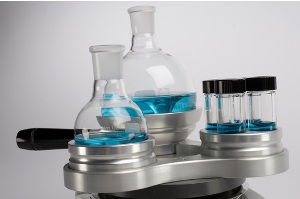The School of Chemistry at Monash University in Melbourne, Australia reports how it is using Asynt DrySyn MULTI heating block systems to support its ground breaking synthetic research in photovoltaics, water splitting and nanoimaging.

In order to improve safety in his laboratories, Leone Spiccia, Professor of Chemistry at Monash University sought laboratory apparatus to replace oil bath systems traditionally used for all general syntheses.
He comments “After a lengthy evaluation process we decided to switch to DrySyn heating block systems as they are inherently safer to use than heated oil baths, avoiding the risk of oil spillage that can lead to burns when hot or may cause someone to slip over”.
Professor Spiccia added “We are using DrySyn products inside our nanoimaging team. As part of this research we synthesise nanoparticles based on lanthanides – for which we must reach high temperatures (> 300 °C). For this work, we need to have precise fine control of both the final temperature and the heating speed together with a good heat transfer to obtain good quality particles with a narrow size distribution. We could not use an oil bath because of the high temperatures and heating mantles cannot provide the control we needed for the synthesis, so DrySyn has been really important to us to achieve good research results”.
The DrySyn MULTI from Asynt provides a safe and convenient way to perform precisely controlled heated reactions in parallel. Affordably priced, the DrySyn MULTI converts any standard hotplate stirrer into a reaction block accommodating three flasks or up to 12 reactions in tubes or vials. Made of chemically resistant, anodized aluminium, DrySyn MULTI heating blocks offer excellent heating performance to over 300ºC and can heat a reaction flask 25 per cent faster than an oil bath.
Photovoltaic research being undertaken by Professor Spiccia and his group at the University of Monash is mainly focused on finding new electrolytes and redox couples for dye-sensitised solar cells and optimising other parameters for the cell assembly. The water splitting team is working on artificial photosynthesis, a concept to convert solar energy into a storable form of energy by splitting water into hydrogen and oxygen. The nanoimaging team works at the interface of chemistry, biology and nanomaterial science. They are pursuing multidisciplinary projects to design, prepare and characterise functionalised nanomaterials intended for application including multimodal imaging as well as therapeutic and diagnostic agents for early detection and treatment of cancer. For further information please visit www.chem.monash.edu.au
Asynt (www.asynt.com) is a leading supplier of affordable products, consumables and services for chemists in industry and academia. With staff of trained chemists - Asynt is able to draw upon this in-depth applications knowledge to provide a high level of customer support for its DrySyn Heating Blocks, Controlled Laboratory Reactors, Synthesis Tools, Evaporators, Circulators, temperature Control Systems, Vacuum Pumps and Laboratory Safety Equipment.
For further information please visit www.asynt.com/product_view.php?ProductID=6 or contact Asynt on +44-1638-781709 / [email protected].